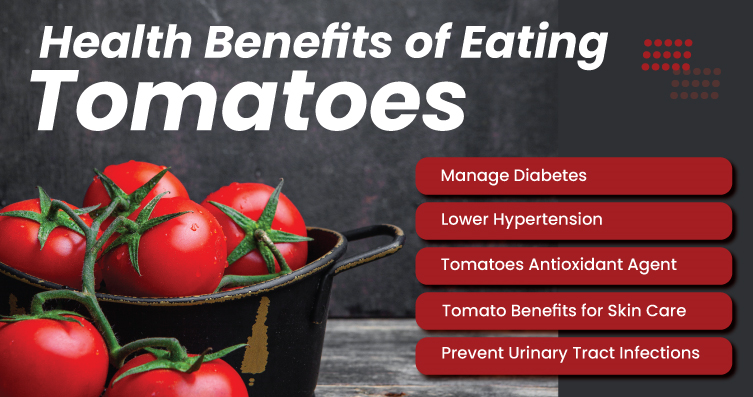Health
Benefits of Eating Tomatoes
The health benefits of eating tomatoes have been known to mankind since ancient times. They are
rich sources of antioxidants that have been proven to be effective against many
forms of cancer. Let’s discuss the benefits in detail. Let’s discuss the benefits in detail.

1. Tomatoes Antioxidant Agent
Tomato
contains a large amount of lycopene, an antioxidant that is highly effective in
scavenging cancer-causing free radicals. This benefit can even be obtained from
heat-processed tomato products like ketchup. The lycopene in tomatoes defends
against cancer and has been shown to be effective in fighting prostate cancer,
cervical cancer, cancer of the stomach and rectum as well as pharynx and
esophageal cancers. It also protects against breast and mouth cancer, according
to studies published by the Harvard School of Public Health.
2. Rich Source of Vitamins and Minerals
A
single tomato can provide about 40% of the daily vitamin C requirement. Vitamin
C is a natural antioxidant which prevents cancer-causing free radicals from
damaging the body’s systems. It also contains abundant vitamin A and potassium,
as well as iron. Potassium plays a vital role in maintaining nerve health and
iron is essential for maintaining normal blood circulation. Vitamin K, which is
essential for blood clotting and controlling bleeding, is also abundant in
tomatoes.
Read Also: Vitamin D: Sources & Benefits
3. Protect the Heart
The
lycopene in tomatoes prevents serum lipid oxidation, thus exerting a protective
effect against cardiovascular diseases. A regular consumption of tomatoes has
been proven to decrease the levels of LDL cholesterol and triglycerides in the
blood. These lipids are the key culprits in cardiovascular diseases and lead to
the deposition of fats in the blood vessels.
Read
Also: Heart Disease Causes Prevention And Treatment
4. Counter the Effect of Smoking Cigarette
The
coumaric acid and chlorogenic acid, in tomatoes, fight against nitrosamines,
which are the main carcinogens found in cigarettes. The presence of vitamin A
in high quantities has been shown to reduce the effects of carcinogens and can
protect you against lung cancer.
5. Improve Vision
Vitamin
A, present in tomatoes, aids in improving vision and preventing night-blindness
and macular degeneration. Vitamin A is a powerful antioxidant that can be
formed from an excess of beta-carotene in the body. A lot of vision problems
occur due to the negative effects of free radicals and vitamin A, being a
powerful antioxidant, can help prevent them.
Read Also: Tips For Healthy Eyes
6. Aid in Digestion
Tomatoes keep the digestive system healthy by
preventing both constipation and diarrhea. They also prevent jaundice and
effectively remove toxins from the body. Furthermore, they have a large amount
of fiber, which can bulk the bowels and reduce symptoms of constipation. A
healthy amount of fiber helps stimulate peristaltic motion in the smooth
digestive muscles and release gastric and digestive juices. This can regulate
your bowel movements, thereby improving your overall digestive health and
helping you avoid conditions like colorectal cancer.
7. Lower Hypertension
Consuming
a tomato daily reduces the risk of developing hypertension, also known as high
blood pressure. This is partially due to the impressive levels of potassium
found in tomatoes. Potassium is a vasodilator, meaning that it reduces the
tension in blood vessels and arteries, thereby increasing circulation and
lowering the stress on the heart by eliminating hypertension.
8. Manage Diabetes
A
study conducted by the Journal of the American Medical Association shows that
daily consumption of tomatoes reduces the oxidative stress of type 2 diabetes.
Read
Also: Diabetes: Types, Causes, Symptoms, Treatment, Prevention
9. Tomato Benefits for Skin Care
Tomatoes aid in maintaining
healthy teeth, bones, hair, and skin. Topical application of tomato juice is
even known to cure severe sunburns. Daily consumption protects the skin against
UV-induced erythema. They rank high in the preparation of anti-aging products.
Read Also: Top 10 Tips To Make Your Clear Skin Look Beautiful
10. Prevent Urinary Tract Infections
Tomato
intake reduces the incidence of urinary tract infections, as well as bladder
cancer. This is because tomatoes are high in water content, which can stimulate
urination; hence, they are a diuretic. This increases the elimination of toxins
from the body, as well as excess water, salts, uric acid, and some fats as
well !
11. Tomato Prevent Gallstones
Regular
consumption of tomatoes can provide relief from gallstones. There have been
various studies to prove their efficacy against many chronic diseases and
varieties of cancer. The antioxidant properties of tomatoes can also be derived
from processed foods like ketchup and purees. Daily consumption of tomatoes
fulfills the requirement of vitamins and minerals and exerts an overall
protective effect on the body.



 Contact Us
Contact Us






 Hospitals
Hospitals
 Doctors
Doctors
 Diagnostic
Diagnostic
 Pharmacy
Pharmacy
 Health Tips
Health Tips
 Blog
Blog


















Comments